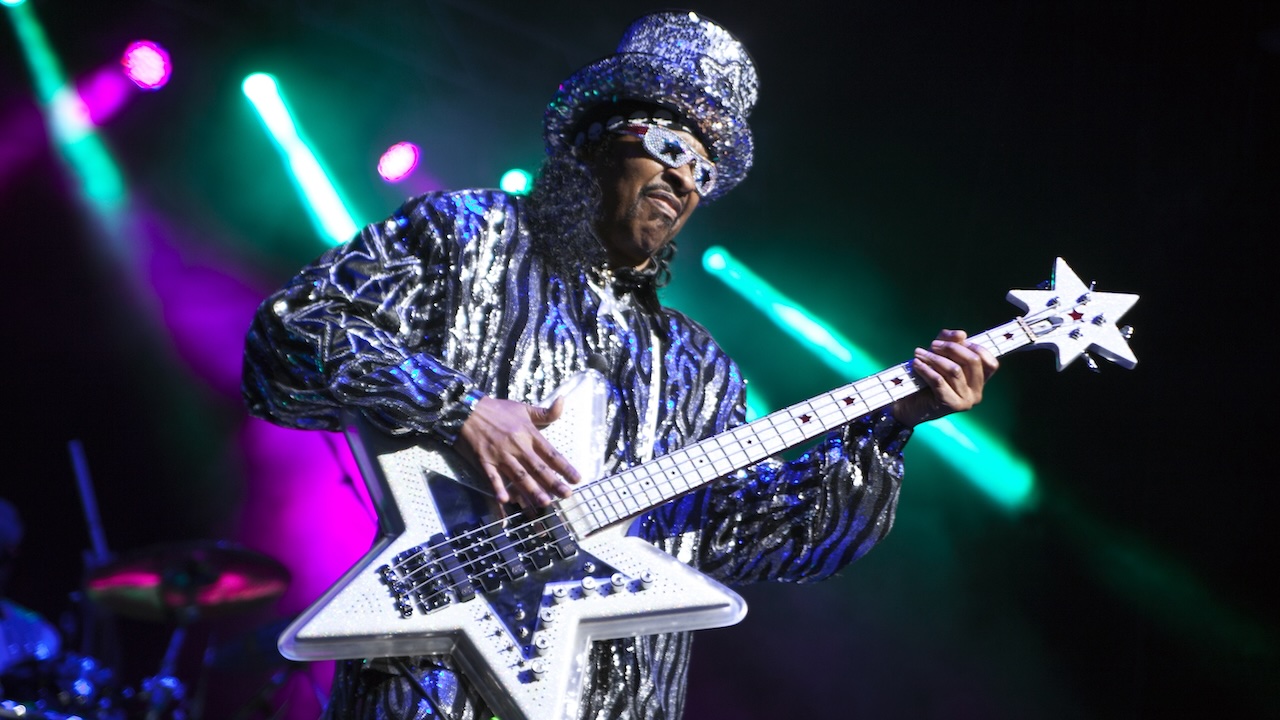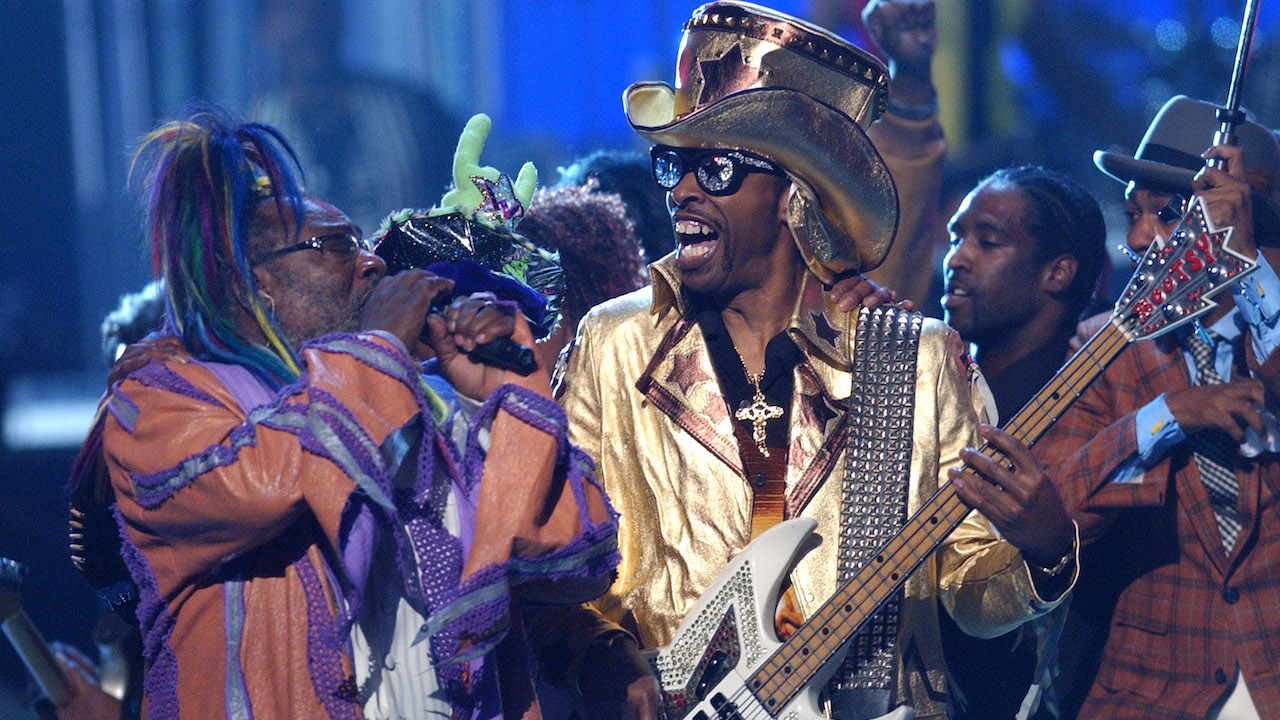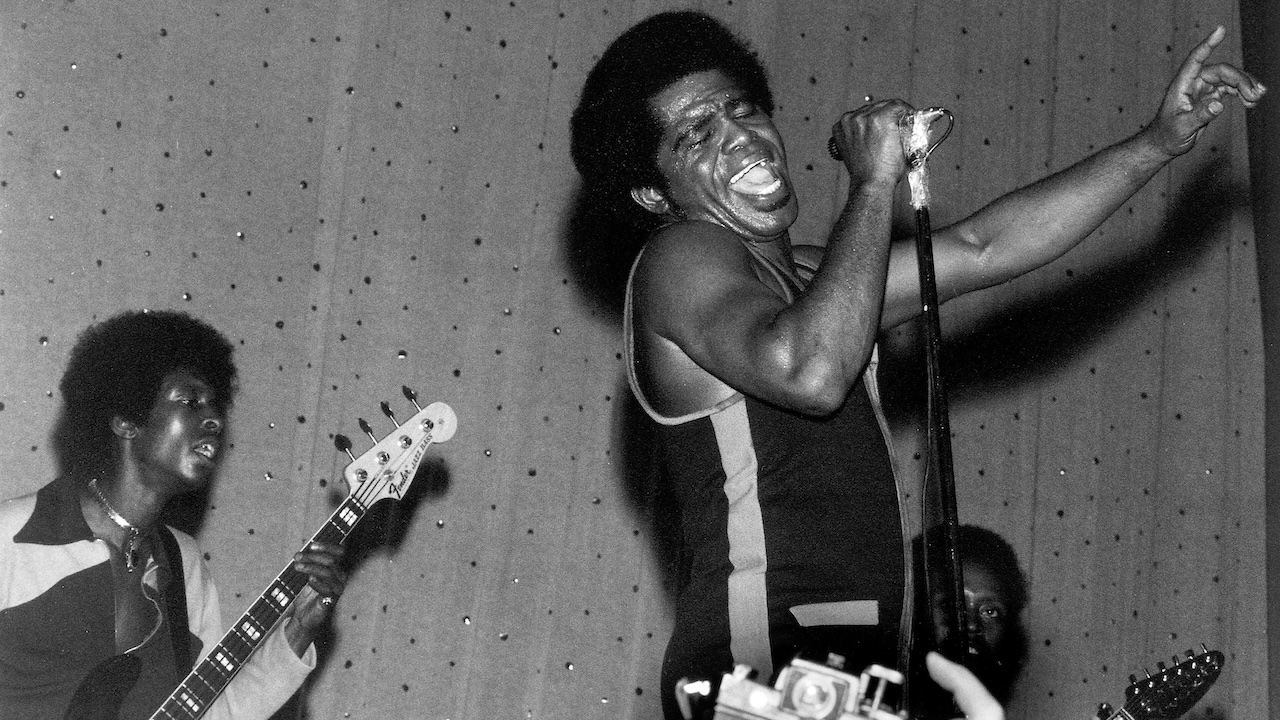
We feature some bona fide bass guitar legends here, but very few come with a pedigree quite like William Collins, or Bootsy as he's known to the entire bass-playing world (and significant chunks of it beyond).
If you're familiar with the man and his playing, you'll know what a force of nature he is, epitomising the stagecraft of the era in which he grew up, and laying down the parameters of the slap and the pop for a generation of bassists.
Born in Cincinatti in 1951, the supremely talented Rock and Roll Hall of Famer is a legend not just for his interstellar playing, but also for his star-shaped basses and off-the-planet style.
The band he formed with his big brother ‘Catfish’ Collins, the Pacemakers, debuted in 1968 and took over as James Brown's backing band for around a year in 1970 – not bad grounding for a subsequent career alongside George Clinton in the peerless Funkadelic and Parliament.
His next big band was the aforementioned P-Funk collective, whose influence has permeated the very DNA of hip-hop and modern soul, while his own Bootsy's Rubber Band took the brand even further.

Now in his early 70s, Collins has stepped back from the live arena on medical advice, although he continues to work in the studio.
When Bass Player last caught up with Bootsy, we were braced for an encounter as unhinged as his onstage character would suggest. But no – Bootsy was cool as a cucumber, mellow to the core and simply happy that we liked his tunes.
The following interview from the Bass Player archives took place in 2017.
Are you aware that you've influenced a huge number of bass players?
“I look at it like everybody brings something to the table, and I have a signature style and sound – and everybody else is either developing that, or getting it together for themselves. I think it's a good thing. I don't think anybody owes me anything: we're all in this universal mixing pot, and you grab certain things out of it and you make it your own. That's the way I look at it.”
Nowadays funk bass is faster and more technical than ever, it seems, at least judging by the bassists we interview in BP.
“They're taking it way, way, way beyond, and it's a good thing, because at one time I remember when a bass player was the scum of the Earth, you know? You were the last one to get chosen in the band. Now it's like ‘You play bass? Oh, cool!’ It's the thing now.”
When did that happen, from your perspective on it?
“It was a gradual thing – it didn't happen all of a sudden. I think I was a part of the change, because Jimi Hendrix was my superhero, and I threw a little bit of his style into the bass. Now they've taken all of that and much more.
“They took what Larry Graham had done and tripled and quadrupled it and funked it up, and it's all just growing and growing. Nobody knows how far it can go, other than Victor Wooten! It's a good time for bass.”
You were contemporaries with Jaco Pastorius. Did you know him?
“I never met him. I did know of him, but I never had the chance to meet him. I got hip to him when he was doing his thing with Weather Report.”
You're known for star-shaped basses. Is the five-pickup Warwick Space Bass still your main instrument?
“That's the main puppy right there. They hooked me up, man. I got two of them that I take on the road, and one prototype that they made at first. It's heavier than the other two, so I keep that one at home. The two I take out have worked out really good: they're pretty happening.”
Which other basses do you still have?
“The Funkadelic bass that I played is in the Hall of Fame, but I still have a ton of my old basses. You remember the 1958 Ampeg with the holes? I got that one, fretless. Victor Wooten came up and broke that in. Oh man, he killed that sucker! We recorded a whole 60 minutes of Victor just playing that bass nonstop.”
“And then I got this Vox bass – remember those old hollow-bodied ones? It's like a Gibson, but with a single cut. It's got fuzz on it, and sustain, with the little buttons you can push. I played that the other day too. I'm re-finding myself, because those are the basses that I started off with. Getting back to that stuff was a great feeling.”
Do you look back fondly at the early part of your career?
“Coming up at that time was the best, because we had a chance to experience the free love and the peace. Now, getting a chance to share that again is what I love. Those good vibes, man. Everything is a choice: you can share the good vibes, or you can get your business hat on and start sharing all of that mess.
“We weren't used to business back then: all we wanted to do was play, especially in the era we were coming up in, which was about playing and getting a few girls and having a good time. It all turned into business, though, and since we didn't know nothing about business, we all went a little crazy!”
The time communing with your fans, never goes away though – right?
“Yeah. That's all you have to hold onto, plus the time you have together, even if it ain't with the whole group. Bernie Worrell would come to my house just to get away from everything.
“All he wanted to do was just walk by himself, and to be allowed his space. I guess every person would want that, but he really needed it, because he was pure genius. He handled it the best that he could, for a good while. I couldn't do enough for him, I wish I could have done more.”
“You don't get friends and musicians like that, it just doesn't happen. I don't take it lightly. When you start talking about him, it's way under the skin, you know? It's like he's in my skin; something you can't get rid of, and you don't want to get rid of it. I know he's physically gone, but I still feel him.
“His setup is still down in the Bootcave, and for me, he's still there. He's still there. If I can do anything for him now, it's to remind people that Bernie was the key to the mothership.”
I have to ask this question. What was James Brown like?
“Oh man... he was that guy, you know. He was definitely that guy! He was a hell of a cat. He worked day in and day out, and you wouldn't understand why he did the things he did, because he just felt that he was by himself. I never understood that, until I got into having to take care of business of my own.
“When I was with him, he kept me real close, to show me things, as if he knew that I was going to be out there myself one day. He showed me as much as he could, without telling me anything.
“He had me flying on the jet with him, telling me that he'd called the radio stations and had them play his songs. He'd go there personally, and he'd take me with him to do this. Not only did I play the shows, he wanted me to see him taking care of business, for some unknown reason. He was hardcore, man. Hardcore.”
Wasn't he famously stingy with money?
“Man, I've seen some stuff... with James, he would always try to break you down. Any time that you knew you'd played a great gig, and the people were loving it, he'd call you into his dressing room and say ‘Haaargh! You just ain't on it. You just ain't on the one!’ I'd be like, 'What? We ain't on the one?’”
“He called in the sax player once and told him to throw his horn away because he wasn't playing nothing but trash. It got to the point where I had to figure out whether this mother was crazy or if he was just messing with us.”
And which was it?
“I determined that he was both of them. He was crazy and he was messing with us! But I gotta say, him telling us that we weren't on the one and we weren't happening, it made me want to practice more.
“He knew what he was doing. You know how sensitive musicians are. That was the biggest letdown, because I was a kid wanting to please Mr Brown and do the best job – and then he called me in the room and told me that. I'm like, ‘Man, what can I do?’
“He told me one time, ‘Son, y'all the greatest band in the world, but you just can't play.’ And the bad thing about it was that he was serious! Couldn't nobody laugh about it at the time, because this was Mr. Brown talking. But when we saw how stupid this stuff was that he was doing, we just started cracking up any time he would say something like that. We would die laughing.”
What was his reaction to being laughed at?
“It worked, because he stopped calling us in the dressing room. We knew we had it, and we said, ‘Okay, that's what that was all about! But before that, man, he was killing us. He was sweating profusely, his knees were bleeding – we just wore him out, and he would still call us in and tell us it wasn't happening.
“And then, when you went out there and messed up, and the show wasn't really good, we'd all go back to the dressing room with our heads down because we'd had a crappy night.

“Sometimes you just have crappy nights, you know. He would call us in there and he'd be laughing, and he'd say, ‘Haaargh! You're killing it! Son, you're killing it!’ When he did that, that's when I really knew that this mother was gone. He was on another planet.”
Thanks for sharing, Bootsy. You've had a career like no other.
“All this happened for real, man. You couldn't make nothing like that up…”







